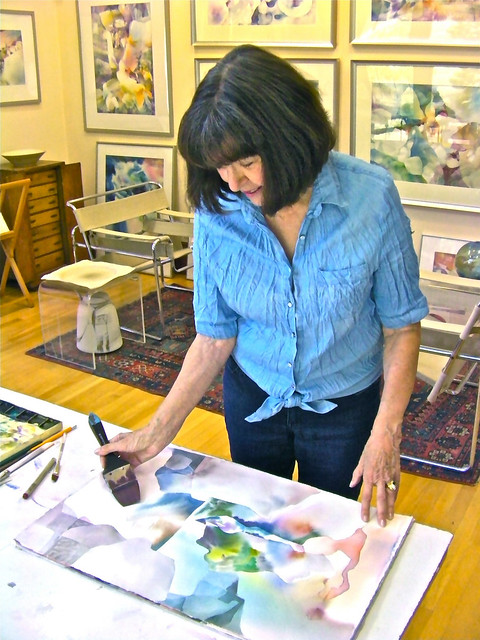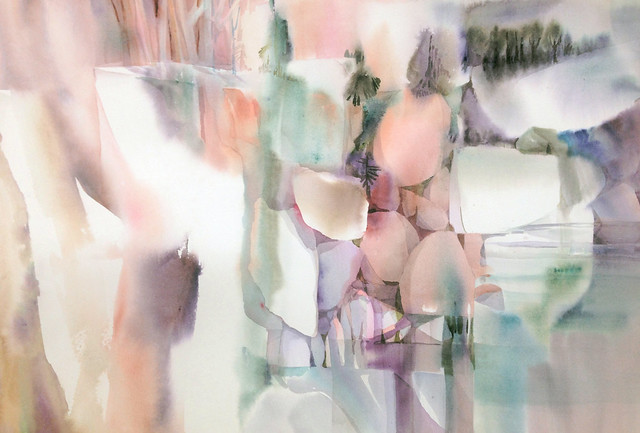Auburn hosts touring exhibition of watercolor artists
Article body
The Watercolor Society of Alabama, one of the oldest major watercolor organizations in the country, sponsors an annual juried exhibition and competition open to watercolor artists across the country. The society’s 77th exhibition, featuring 80 artists, will be on view May 20 to July 29 at Jule Collins Smith Museum of Fine Art, Auburn University.
The museum’s Curator of Collections and Exhibitions, Dennis Harper, said that watercolor is a medium that connects contemporary practitioners to artists dating back centuries. “German Renaissance artist Albrecht Dürer, 19th-century British painter J. M. W. Turner, Americans John Singer Sargent, Winslow Homer and Andrew Wyeth all used watercolor in a spontaneous, fluid manner very much in tune with the 21st-century artists’ work on view here,” Harper said.
A juror of selection curates the competition, and an awards judge visits the installation and community to conduct a workshop and name the winners. This year’s awards judge, Barbara Nechis, will hold a workshop May 17-19 at the Jan Dempsey Arts Center in Auburn. A deposit of $200 is due May 12, and the course is $360 for Watercolor Society of Alabama members and $400 for non-members. A registration brochure is available online.
Organizers said the workshop is for all who want to gain a deeper understanding of the creative process of painting, are willing to be flexible, take risks and have fun. The approach is how organizers described Nechis’ work and her balance of spontaneity and control of the watercolor brush. She served on the faculty of Parsons School of Design for many years and taught seminars at Pratt Institute, throughout North America, Europe and Asia. Her work appears in the collections of the Butler Institute of American Art, IBM and Citicorp.
“The unpredictability when working with a lot of water creates effects I couldn't dream of and when a viewer asks how something occurs, I can explain why an effect happened but it is almost impossible to repeat exactly,” said Nechis. “Although watercolor can be tricky and may take longer to master, it is so helpful in producing results that even beginners can appreciate in their work.”
Nechis said that when judging work, she notes which pieces she responds to without analyzing why, looking for work that appears to be particular to each artist. “The artist’s conviction and originality in portraying the subject matter is important,” she said.
Most recently, the national exhibitions have been held at the Jemison-Carnegie Heritage Hall Museum in Talladega; Johnson Center for the Arts, Troy; Littlehouse Galleries, Homewood; Tennessee Valley Art Association, Tuscumbia; Hartselle Fine Arts Center, Hartselle; Carnegie Visual Arts Center, Decatur; Fairhope Arts Center, Fairhope; and Alabama Center for the Arts, Decatur.
Visitors who are interested in purchasing an exhibited work should contact Jaceena Shepard with the Watercolor Society of Alabama at jaeshep@aol.com. Museum staff members do not handle transactions or appraisals.
For more information about Jule Collins Smith Museum of Fine Art, Auburn University, visit jcsm.auburn.edu or call 334-844-1484. Museum admission is free; a five-dollar donation is appreciated. JCSM memberships start at $50 and support museum programs.
The exhibition is part of the museum’s summer exhibition schedule, which also includes outdoor sculpture, printmaking and photography.
Related Media
Media interested in this story can contact Communications Director Preston Sparks at (334) 844-9999 or preston.sparks@auburn.edu.
Auburn University is a nationally ranked land grant institution recognized for its commitment to world-class scholarship, interdisciplinary research with an elite, top-tier Carnegie R1 classification, life-changing outreach with Carnegie’s Community Engagement designation and an undergraduate education experience second to none. Auburn is home to more than 30,000 students, and its faculty and research partners collaborate to develop and deliver meaningful scholarship, science and technology-based advancements that meet pressing regional, national and global needs. Auburn’s commitment to active student engagement, professional success and public/private partnership drives a growing reputation for outreach and extension that delivers broad economic, health and societal impact.







